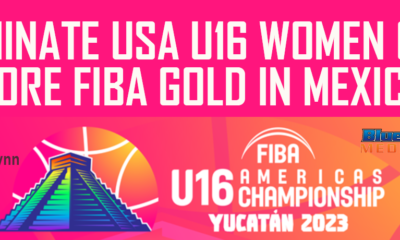SAN CRISTÓBAL de la Laguna, Tenefire, Canaries— There’s so many levels this can go. For many of these national teams and players it’s onto the 2020 Tokyo Olympics less than two years away.
For others reflection and needed change after some unexpected performances like France and Canada. And there’s the historical performance by Belgium and Nigeria who were the darlings of this tournament for their spectacular play. The Belgium Cats made their first FIBA Women’s World Cup Final Four appearance and Nigeria became the first African Women’s team to into Women’s World Cup bracket play. And then there’s the USA, capturing it’s 3rd consecutive and 10th overall goal medal after beating Australia in the finals.
This 18th edition of this event now runs under the name FIBA Women’s World Cup and reflects the desire by the global operating body FIBA to have it’s own event outside the IOC and Olympic banner. In the past Federations within FIBA has to prepare their National teams for the Olympic schedule every four years. With the inclusion of the FIBA World Cup it’s now a two-year cycle of 2018 World Cup, 2020 Olympics and 2022 World Cup and back to Olympics in 2024. This “new cycle” of competition now comes with an elaborate series of “Play-In” events now called Pre-Qualifiers in three regions and throw in four Olympic Qualifying (WOQTs). In the odd year this even becomes the World Cup Qualifiers. This is same scheme as the FIBA Men’s World Cup. Confused?
This means every Federation, every professional women’s player has to be ready for some level of International competition every year. And, if you’re making your money overseas or player in the WNBA or a combination of both, you will be looking at a lot of basketball for surely less money than the men. And, finding the right talent and even coaches for these national teams becomes an issue when everyone has some kind of contractual arrangement elsewhere.
One catch to all of this, if you’re the USA, is where’s the benefit to winning? The Gold Medals are wonderful but it’s always been a way not to have to endure all these “play-in” qualifiers. You didn’t require NBA pros in season or after to put a USA Basketball team together for FIBA play. This year the World Cup camp immediately after the WNBA Championships where Seattle Storm’s Breanna Stewart, the regular season and tournament MVP along Sue Bird and Jewell Loyd had to skip the pre-Cup competitions only to join the team here in Tenerife.
Here’s the schedule: 2019 June-September FIBA Women’s Continental Cup, November Women’s Olympic Pre-Qualifying Tournament, 2020 February FIBA Olympic Qualifying Tournament, July-August 2020 Tokyo Olympics. There’s no break this time. Within months back to the FIBA Continental Cup Qualifiers in November 2020 and February 2021. June to September 2021 for FIBA Continental Cups, November 2021 FIBA World Cup Pre-Qualifers and in January-February 2022 the FIBA World Cup Qualifiers and in September 2022 the Women’s World Cup. Confused? Think how the crowd that was at the press conference here in Tenerife felt when looking at their “roadmap.” The discussion about what Regional Continental Cup and Olympic Pre-Qualifier and Olympic Qualifier winners will be byes into the Olympics has not been discussed. If you win one section, what now? Some critics expect a change after all the criticism has been leveled.
Follow the dates: (19) June-Sept CC / Nov OpQT / (20) Feb WOQT / Sep Olympics // Nov-Feb (21) CCQ / June-Sept CC / Nov WCpQT / (22) Jan-Feb WCQT / Sept – WWC and it repeats again.
And, the fine print said: the Olympic & World Cup winner has to play in each of the Olympic Qualifying Tournament and World Cup Qualifying Tournament – but advances to the Final event despite any score or result. If the USA were to be that team, then they wouldn’t have to “qualify,” just bring a team. A great chance for a USA Developmental team to play but more added expense.
The biggest concern was the financial impact on many of the smaller Federations who now will have to compete in 2-4 events just to get to the Qualifying Tournaments for Olympics and World Cup. Even those elite teams may have to suit up more than expected to reach either the Olympics, World Cup or both. Only the major European FIBA teams may have enough bodies participating at all level to compete with this schedule. Right now the USA and Canada prepare youth teams for the U17/U18 and U16/U19 on a year by year basis. In Europe they play U16/U18 every year in at least three Divisions per age. This allows each birth year to have a change at high level competition. Because of the lack of finances and support few in the America region (USA, Canada, Mexico) could cover this Euro schedule. In the USA don’t be born in the wrong year. You may never make a USA Basketball team.
If the timing is perfect, you’re a Breanna Stewart who was able to join the USA Basketball U16 team at 15 and continue on her storied road to greatness. In the post-World Cup press conference Stewart said, “I came here right after the WNBA Championship and the focus was on getting a gold medal. I really haven’t had the time to process all of this (acclaim and championships) yet.”
In the FIBA press conference a major question was feedback and commentary from the players taken into consideration? The answer was somewhat of a no but sounded like it was a yes.
USA Basketball legend Diana Taurasi at the post-game World Cup press conference described this as the hardest event to compete in, even more than the Olympics, because this is the only event where you have to play the last three games in three days. Even the Olympics have an off day before the last two games.
Processing will be important for those who want to reach the Olympics in Tokyo. With this win the USA will advance to the 2022 World Cup and already have a spot in Tokyo. Led everyone else figure out the FIBA 2020 and 2022 Road Maps.
Mike Flynn is owner and operator of Blue Star Basketball and U.S. Junior Nationals. He is a National Evaluator and publishes the Blue Star Report which ranks the top 100 high school girls basketball players in the nation. He also serves as Secretary of the Middle Atlantic District AAU, National Chair for AAU Lacrosse, Consultant to Gatorade for girls basketball, member of the McDonald's All–American selection committee, & Consultant for Nike Global Basketball.











